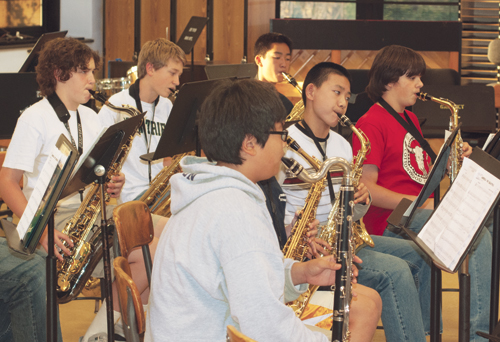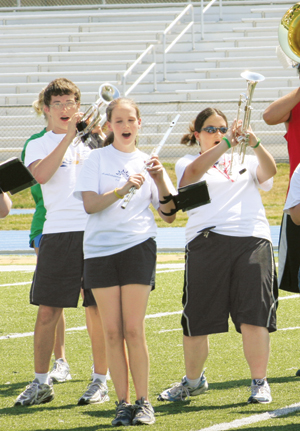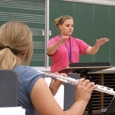
Over the years many outstanding directors, performers, and composers with years of experience have offered their advice to new and prospective teachers. As the new school year begins, their words of wisdom have much to offer whether a director is starting in a first position, switching to a new school, or seeking to rejuvenate teaching methods.
James Croft: I have the band stand up when I step up on the podium. It’s impossible to continue playing (and silence is automatic) and a physical indication that the rehearsal is about to begin. It has been an effective technique when and wherever I’ve used it, and I’ve been doing it with school groups for 35 or more years.
Ross Kellan: It is important for teachers to set standards right off the bat. Explain on the first day what you expect from them and what they can expect from you. Stress the importance of starting and stopping together. You can avoid many potential discipline problems by keeping rehearsals moving at a quick pace. Avoid long-winded explanations. When a student intentionally disrupts a rehearsal, you should respond immediately. A stern look in the student’s direction may convey the message, but sometimes stopping to tell the student of your disapproval is in order.
Arnald Gabriel: In your first year of teaching do not drive a more expensive car than your school principal drives.
Frank Battisti: When I was a young teacher, I wanted to resign every other day because of frustration. Beginning teachers want to make things happen, but they’re not old enough to realize that this takes time. Establishing who you are, what your style is, and communicating with parents, administration, teachers, and students takes time, and there is frustration involved.
Robert Sheldon: At the beginning of the school year I try not to take myself too seriously. It’s easy to get caught up in a contest or a football game and forget that the reason I became a director was to teach students how to perform high-quality literature.
Stewart Ross: Get off the podium often and walk around the band; it gives a different perspective, and you can hear individuals and sections. Check the group’s ability to keep time while forcing them to concentrate harder without a beat up front. When necessary clap or hit a woodblock to sustain a consistent tempo.
James Warrick: Never put your car keys on the same key ring as your school keys. If you do, you will be walking home the day your tuba player borrows your keys to look for his music in the auditorium and forgets to return them to you.
Shirley Mullins: Never schedule a high school concert during prom or homecoming week, and never ask your principal for anything on Friday afternoon.
James Lambert: Relax and don’t try to teach everything you know in one year.
 Mark Grauer: There are two things I wish I had done better as a younger teacher. The first is to keep my cool and never overreact to inappropriate behavior. I still wince when I think about how my temper flared if students did not behave to my expectations. I could have avoided most of my problems with better prevention and better communication with parents. The other thing I wish I had learned sooner was how to be a better listener to students. There were many times in my first years of teaching when I could have been more help to my students if I had only stopped and listened.
Mark Grauer: There are two things I wish I had done better as a younger teacher. The first is to keep my cool and never overreact to inappropriate behavior. I still wince when I think about how my temper flared if students did not behave to my expectations. I could have avoided most of my problems with better prevention and better communication with parents. The other thing I wish I had learned sooner was how to be a better listener to students. There were many times in my first years of teaching when I could have been more help to my students if I had only stopped and listened.
Robert Laber: The most important variable in controlling rehearsals is the attitude and focus of the teacher. My first teaching job was in a volatile city high school; an attitude of this-is-business-not-personal worked for me, particularly with students who were inclined to be difficult.
It is important for a director to come to each rehearsal with a focus, a driving sense of what should be accomplished musically that day. Get the rehearsal started immediately with the same routine each day. Keep the rehearsal moving and do not become bogged down with one section or individual. Don’t waste time talking at the onset, and keep students playing as much as possible. This limits the opportunities for students to be disruptive, and they will respond to your momentum and seriousness of purpose. Your chance to ease up and get to know students is when they come in for lessons or to work on parts.
Alfred Reed: And now there abideth Rhythm, Melody, Harmony, and Timbre, but the greatest and most important of these is Rhythm. Without Rhythm, nothing can be done; with it everything else becomes possible.
Victor Bordo: Many years ago I taught a seventh grade band with 120 students in the ensemble. A very competent student teacher was assigned to me and she had very liberal ideas about teaching and wanted to be a friend to each student. In those days student teachers were required to keep a diary of their daily student teaching activities. Although she had only observed me teaching twice, she concluded in her log, which I was required to read each week, that I was a dictator who stifled the seventh graders’ creativity.
We discussed this issue on numerous occasions, but I could not change her outlook. I determined that the best course of action in this instance was to administer some shock therapy. This was a talented young lady, who in my view and that of her university advisor, was going down the wrong path in music education. I offered her the opportunity to conduct the band for three full periods to demonstrate her ideas about teaching; the only stipulation was that if she got into trouble, she was on her own. She readily accepted, and the first period went pretty well because the seventh graders did not know what was going on – but it didn’t take them long to find out.
Ten minutes into the next rehearsal, a cornet player reached over and knocked his mute off the music stand; everybody stopped and looked at me. I didn’t move a muscle, and the game was on. They did everything they could for the next 40 minutes to driver her nuts. Playing wrong notes, exchanging instruments, talking out of turn, and blasting their horns. She pleaded with them, but to no avail. She finally left the room in tears, and I restored order to the class. We sat down after rehearsal, and I began by saying “You have to demand the respect of your student before you can teach them anything. They don’t need a 21-year-old friend; they need a 21-year-old teacher.” She admitted her ideas didn’t work too well.
Bruce Moss: Always teach to the best students, and bring the others up through this motivation.
Kerry Hart: To improve quality, try to have every student play by themselves in front of their peers at least once or twice a week. If your students know that they may be expected to play that rough spot by themselves at any given moment during rehearsal, they’ll practice harder and more consistently.
Robert Klotman: Your best friend in the building is the custodian. Stay on his good side.
James Ployhar: Try maintaining discipline with the eyes rather than the mouth. A silent stare of disapproval in the direction of a troublemaker can do wonders in quieting the rehearsal room.
John Thomson: Learn as much as you can about the secondary instruments. Few undergraduate music education curriculums have the time to teach the comprehensive understanding that you will need to be an effective teacher.
Stuart Ling: The tone and pace of rehearsals should reflect how much rehearsal time you have. If there are rehearsals five days a week, the pace will be very different from a situation in which there are only two rehearsals a week. Directors facing block scheduling may have limited rehearsal time and should select music that isn’t too complicated. It is a mistake to give a band music that is beyond what they can prepare in the available time.
Ron Keller: Know the piece well enough that you can teach the difficult passages first. It will save precious rehearsal time.
Kenneth G. Bloomquist: When you stop in a rehearsal to say something, be brief and get to the point; say exactly why you stopped. For example, if the players are out of tune, don’t just say, “tune it up.” State whether they are sharp or flat.
Quincy Hilliard: College taught me the mechanics of teaching band intonation, balance, fingerings, and charting drills. What I needed in addition were courses dealing with administrators, making out a budget, fundraising, setting up and dealing with a band parent organization, handling discipline problems, and how to sell your program to the school and community. It is one thing to know the subject matter, quite another to have to teach it in an environment that is not a college lab.
Mark Kelly: It takes a long time for young directors to learn to hear multiple sounds. They may have played trumpet, clarinet, or violin, but this is training to hear one line at a time. It takes a while to be able to stand in front of an ensemble and discriminate between the sounds you hear. By the time you have evaluated one sound, the music has moved on. All young directors should record rehearsals and listen to the recording afterwards as a way to sharpen their hearing. They can also evaluate what they did and did not stop for.
Robert Grifa: At the start of the school year I distribute a detailed handbook that covers everything about the program. I have learned not to become upset if things have changed over the summer. If my number one tuba player has moved away or the administration changed something and didn’t notify me, I try to attack the problem instead of complaining about it.
Michael Ross: I try to remember that most students will not become music majors and did not join the band to become the world’s greatest flute or trombone player. Some high school students join the band because they like wearing funny uniforms, others because this is a way to get out of the house on the weekend. If I remember to keep things in perspective and let students have fun, everything goes a lot smoother.
Charles Groeling: Never program a piece the students cannot sightread. Concert preparation should not take more than four weeks in a normal high school setting. A concert program should be a spinoff of skill development and not necessarily the source of such development.
Robert Sheldon: My favorite memory is the fall I returned to school and discovered that students had redecorated my office. This was my first teaching job, and I had written the school song for which the students wanted to thank me. Somehow they received permission to enter my office and paint it over the summer. On the wall behind my desk they painted cartoon bubbles. The first four measures of the school song melody were written in the biggest bubble, so as I sat at my desk it appeared that I was thinking of the school song. I knew something was up when I arrived on the first day of band camp and many students were waiting outside my office with these goofy grins on their faces. After 22 years I still remember those students.
Instrument Tips
Alice Render (horn): Watch that the mouthpiece does not slide downward; this is the natural effect of gravity on the horn in the hands of a small child. When a student appears for the second lesson, the embouchure will probably have moved down from 2/3 upper lip to half upper and half lower lip. Move it back up and emphasize the importance of practicing in front of a mirror to verify that the mouthpiece is where it should be. If a student knows this is likely to happen and looks out for it, the odds are improved that a good embouchure placement will emerge.
Joseph Gingold (violin): It is very important for violin students to begin by holding the instrument correctly. The left hand should support the violin so it is even with the chin and not drooping because the bow will droop with the instrument and end up almost at the fingerboard. The right hand is equally important and should draw the bow in a straight line and not exert too much pressure. Our terminology, saying up bow and down bow, may imply pressure. The French have a better way of describing bowing: push and pull.
Fred Hemke (saxophone): The first thing teachers should do is to be sure students have a top quality mouthpiece with a normal blade or facing. A good mouthpiece can improve a student-model instrument dramatically and makes all the difference in producing a good sound. Band directors should not allow beginning players to use a jazz-type mouthpiece or an inferior, standard mouthpiece that sometimes comes with a student-line instrument. It is best to start students on a #2 reed and progress to a #3 reed within the first year. Players can use #3 reeds with a good mouthpiece forever.
Harvey Phillips (Tuba): I have never known a fine low brass player who used more lower lip than upper; the ratio should be 3/4 to 2/3 upper and 1/4 to 1/3 lower. Teachers should watch for bad posture in beginners, particularly small students who hold the instrument in an unconventional way to reach the valves. A small player should stretch his arm to reach the valves, not pull the tuba down so the valves are horizontal. That causes hunching, which prevents proper breathing.
David Hickman (Trumpet): Puffed cheeks are a sign of a poorly developed or formed embouchure. Avoid loud playing until the embouchure is strong enough to play at least one octave. Mezzo-piano to mezzoforte is a good dynamic range for beginning students. Often students play loudly because they have a poorly formed embouchure and that is the only way to get a sound.





